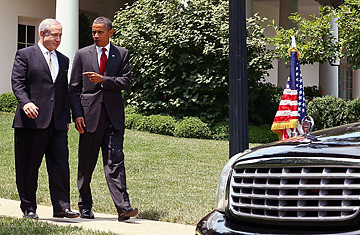
President Obama, right, walks with Israeli Prime Minister Benjamin Netanyahu as they depart from the White House
Israeli Defense Minister Ehud Barak arrived in Washington this week with the message that not even the far-reaching sanctions adopted by the U.S. and its allies against Iran are likely to change Iran's behavior. "It's still time for sanctions," he told the Washington Post in an interview. But "probably, at a certain point, we should realize that sanctions cannot work." That assessment squares with one offered by CIA Director Leon Panetta in a recent TV interview: "I think the sanctions will have some impact ... Will it deter them from their ambitions with regards to nuclear capability? Probably not."
Barak's visit came as the European Union on Monday adopted far-reaching trade sanctions that included bans on investment in Iran's oil and gas sector, and British Prime Minister David Cameron on Tuesday urged Turkey to use its close ties with the Iranian regime to tell Tehran to change course. The Turks, while accepting their obligation to adhere to the U.N. sanctions against Iran that they opposed, have publicly refused to abide by the additional measures adopted by the U.S. and the E.U. Instead, they are expanding their trade ties with Iran to help fill the gaps left by the withdrawal of other partners.
Iran, meanwhile, is expected to resume talks in September with Western powers over a fuel-swap deal brokered by Brazil and Turkey shortly before the latest round of sanctions. That deal does not address the fundamental issues of the standoff, but it was designed as a confidence-building measure that could help change the increasingly confrontational dynamic over Iran's nuclear program.
But in Washington, the gloomy outlook on sanctions has been accompanied by a growing rumble of war talk. My TIME colleague Joe Klein recently reported that the military option was "back on the table" because Washington was not prepared to settle for "containing" a nuclear-armed Iran if sanctions failed and because U.S. officials believe that America's Arab allies support a military strike. A steady parade of pundits — many of them the same ones who advocated loudest for invading Iraq — is calling for military action. Hawkish former CIA operative Reuel Marc Gerecht advocated bombing as the "better safe than sorry" option, downplaying the backlash throughout the Middle East and possibly beyond that the Pentagon anticipates would result from a preemptive attack on Iran.
Appearing on CNN on July 25, General Michael Hayden, a former CIA director, was asked if, assuming Iran remained defiant in the face of sanctions, there was "any alternative to taking out their facilities." Hayden answered that "Iran, left to its own devices, will get itself to that step right below a nuclear weapon, that permanent breakout stage ... And frankly, that will be as destabilizing as their actually having a weapon." Then he suggested that the Obama Administration's aversion to bombing Iran had diminished: "When I was in government, what we used to mystically call 'the kinetic option' was way down on our list. In my personal thinking — in my personal thinking; I need to emphasize that — I have begun to consider that that may not be the worst of all possible outcomes."
Barak's visit is particularly relevant at this moment because of recent media reports — much of them sourced to top Israeli officials — that the U.S. is now closely coordinating its Iran plans with Israel in order to head off the possibility of Israel's launching its own military action. More hawkish elements in Washington are also pressing for open U.S. support for an Israeli strike. One-third of the GOP caucus in the House signed on to a resolution introduced last week expressing support for Israel's right to use military force against Iran's nuclear program.
Despite the escalating war rhetoric, conventional wisdom holds that the U.S. military establishment and even President Obama himself believe that the potential consequences of a military strike that plunges America into a third war in the Muslim world are so grave — and the prospects for such a strike to prevent or deter Iran from eventually attaining nuclear weapons so dubious — as to render it too reckless an option. Nor is there any legal basis for it; a U.N. Security Council authorization for military action against Iran is unthinkable unless Iran attacks another country or moves to do so. And most of the international community — including most of those countries that backed the latest round of sanctions — would strongly oppose it. Obama is an indefatigable internationalist, and if he were planning to launch a military strike against Iran, it's reasonable to expect that he'd be engaged in the protracted process of trying to establish a basis for such action at the U.N. and in international public opinion. No signs of that, at least not yet.
Obama has, however, insisted that a military option remains "on the table." That insistence could be consistent with the perspective of his key adviser on Iran, Dennis Ross, who wrote two years ago, "When we say we are not taking force off the table, that must be more than a slogan. It is essential that the Iranians continue to believe that they may well be playing with fire if they persist in their pursuit of nuclear weapons." Regardless of whether force is ever used, Ross was arguing, the only way Tehran will back down is if it's convinced it will face U.S. military action if it doesn't.
The problem, of course, is that rhetoric can have political effects that narrow the options available to decisionmakers. If you've publicly declared Iran's nuclear program sufficiently threatening to warrant initiating a potentially catastrophic war and then sanctions fail to achieve their defined goal, you may have a hard time walking back from that threat.
